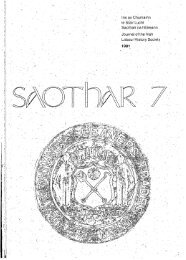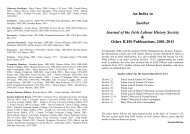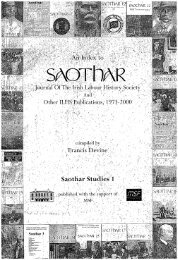ReviewsJohn Horgan, Labour - The Price of Power, (Gill andMacmiVan, Dublin; 1986),'pp. 191, £6;95 ~.This book is not a scholarly analysis of the history,philosophy or performance of the Labour Party. It is,however, a readable and frequently gossipy stUdy of theparty from the mid-1960s to mid-1980s. Within the restrictiveparameters of the book there are thoughtprovoking sections on organisation, fmance;-trade unionsand electoral strategy. Of these the treatment of theparty's Commission on Electoral Strategy is superiorand more comprehensive. There are also .some goodpen sketches of many well known party and ex -partypersonalities.The book is marred.by.a number. of inaccuracies,the most glaring of which require attention. Horganrefers to John Ryan scraping home in 1977 following an87% transfer from DavidMolony of Fine Gael (p.9). Infact Ryan was easily elected and Molony was not acandidate. Miclc Lipper of Limerick ran as a Labourcandidate in the Donagh O'Malley by-election in 1968and not in 1973 as stated (p. 63). David Thomley losthis seat in 1977 not 1973 (p. 68). Senator Chris Kirwanis accused of 'voting against security legislation' therebylosing the Labour Whip (p.1l7). In fact, Kirwan andDeputy Michael Bell both lost the Labour Whip whenthey voted against the first 1982{3 Budget. Neither JoeBermingham (Kildare) nor John Ryan (North Tipperary)were elected in 1969 (p. 173). Both were firstelected in 1973. The unkindest cut of all! I received34% of the first preference vote in the 1985 LocalElection, not a mere 22% as stated (p. 14)! Such lackof attention to detail renders the book useless forreference purposes. .For some of the years covered by this book Horganwas a Labour Senator and later a Labour Deputy. I amaware from my personal contacts wi th rum that he holdsa politically centrist position and his examination of theLabour Party should be viewed in this context. Practicalityand professionalism would probably summariseHorgan's outlook and these are desirable ingredientsbut they must be held in conjunction with firm socialistobjectives of transforming society lest they degenerateinto dangerous and unprincipled opportunism. Somequotations will best illustrate Horgan's position.He writes of a 'maximum appreciation' of the factthat Labouf'operates in a-hostile environment, that'labour strategists have spent too much time analysingthe economic and social structures of society and toolittle time looking at the political structures'. It is notsurprising, therefore, that he later warns of the 'mythologyof1969' and of the 'real risk of attempting to dragthe party back to an Ireland that no longer exists andperhaps did not exist even then'.This is followed by a very muddled examination ofdefinitions of the working class - his italics: He urgesthat Labour should now look at some of its mostche~ished sacred cows in the light of the degree towhich - if at all - they contribute to what should be thetwo key objectives of the socialist society: ·~economicefficiency and distributive justice'. Socialism to him is,apparently, defmable as achieving 'equality and personalfreedomS' .The following sentence reveals perhaps most clearly.Horgan's ideology: 'People for whom belief in equalityis the dominant political motivation are a large andvaluable constituency, and if Labour neglects them topreach a hoary rhetoric conceived in the midclle of theindustrial revolution a century or more· ago, it willdeserve to lose them'. After eight years of Reaganismand Thatcherism, and in view of the daily threat to hardwonbasic trade union rights as exemplified in thePackard dispute, such an outburst from one describinghimself as a socialist is nothing short of astonishing.The book seems to reflect the new waveofrevisionismamong some British intellectuals. Many of thetraditional concepts and values of the Labour Movement,according to this new orthodoxy, must be discarded,especially conceptions of socialism. Connollyand Larkin are thus taboo. Not once does Horganmention Connolly, the party's founder and whose nameis invoked in the Labour Party Constitution.My opposition to such views does not imply nonrecognitionthat much has changed and that analyses ofcapitalist society and the alternatives need constant reexamination.Space does not permit further commentin this controversial area except to state that Connolly' slife and teachings still have a sharp relevance for theexisting capitalist order.Emmet StaggNoel Browne, Against the Tide, (Gill and Macmillan,Dublin, 1986), pp. 281, £9.95 paperbackLord Byron in his famous poem Don Juan declared'I want a hero, an uncommon want'. MyoId schoolmasterunkindly commented, 'No one wanted a heroless than Byron. He was his own hero'. So it is withNoel Browne. He will always hold an honoured placein the struggle for social change in Ireland and he haswritten a very remarkable and well written book. Inmany respects however, it is very bitter and unbalanced.Those parts of Against the Tide which relate theharrowing details of Brow ne 's family history when onetragedy of sickness closely followed another were verymoving. His account of the Mother and Child Scheme54
REVIEWScontroversy is real history. Yet the book is marred bythe messiaruc roieasswned by the author. There is theassumpiion that no one in political life or in the labourand socialist movement cared as deeply as himself ortried to do as much for the underprivileged. There islittle if any recognition by Browne, the socililist, of thedecades of struggle by the labour movement for thesocial advantage of our people.We are reminded of his 'adamantine stand' onprinciples, that he was the first Cabinet Minister 'seriouslyto concern himSelf with doing something for thesick and aged'. There eventually comes the piece deresistance: 'That was 'my last attempt to drag thereluctant Republic out of the nineteenth century '. Thatsentence swnmarises the spirit of the book and followsan account of the row which erupted, especially in theLabour Party, when in the course of an attack on churchdomination he made a suggestion of 'sexual ambivalenceamong celibate clergy'.'During the course of his career Browne was amember of five political parties: Clann na Poblachta,Fianna Fail, National Progressive Democratic Party,Labour Party and Socialist Labour Party. The latterparty, his last, mysteriously gets no mention whateverin the book. Very few of his mentioned associates inthose parties escape his attacks which are often bitter.The list is lengthy and includes MacBride, de Valera,Norton, Corish, Hartnett, Thorn!ey, Jim Larkin Junior'and Justin Keating. Many of the strictures are welldeserved, some are untrue or stretch credulity whileothers are vindictive. Some personal descriptions aregrossly offensive; his pen picture of William Norton ata banquet shows appallingly bad taste. Some read likecaricatures and are drawn with Dickensian skill. Infact, a photograph of the author shows him holding acopy of the Dickens masterpiece Pickwick Papers!Among the most confusing aspects of the book arereferences to socialism and communism. During hiscareer Browne made some speeches favourable toCommunist States. It is difficult to reconcile suchexperiences with some local witch hunting activities.In 1958 he stated at a meeting in UCD(not quoted in thebook): 'Ireland had a devout and zealous communistunderground, whose members had infiltrated the tradeunion movement, the press, the civil service and politicalparties. If the economic situation in Ireland andBritain worsened the communists would be presentedwith an opportunity to take over the country.'I was then an executive member of the Irish Workers'League. Our reaction to this statement was one ofshock. We delegated our Secretary MichaeI O'Riordanto interview Browne. He was to point out to him that wewere an open organisation, we were not undergroundand would he explain,Browne's response to 0' Rlordan w as to assure himthat he had not the IWL in mind, that he admired us aswe had nailed our colours to the mast. He had others inmind and proceeded to mention names which may notbe disclosed. The whole outburst was a farrago ofnonsense.' The motive? Possibly a tactic to counterwitch-hunting activities against himself. It is part of theenigma which characterises much of Browne's politicalcar~r.- TJlls enigma finds further expression in a chapter ofthe book entitled 'The Left In Ireland'. It isa strangetortuous. mishcmash. Reflecting the statement onCommunists aITeady quoted we find him stating thatthey (the Communists) were compelled to adopt threebroad strategies. One was for certain members to 'fade'into various key activities and 'wait'. There were thecommitted open Communists and then th(!re ""as thethird group which would enter a competing left winggroup, cause a split' and so eliminate it'. No authorityis quoted to support these allegations. Maybe he isrelying from memory on police reports to which he wasprivy when a member of the Cabinet. In fact, Browneadmits at the beginning that he kept no records andrelies heavily on his own memories and that of others.One must ask at times how reliable is Browne's memory.Police reports are often notoriously unreliable.Despite such theorising Browne did have somesympathy with the small harassed Communist movement.In fact while not being explicit about himself herecords that his wife Phyllis 'accepts the Marxist analysisof society'. He admires Grarnsci whom he describedas a Socialist rather than the Communist which he was.His references to Labour Party leaders are exclusivelyhostile extending to Jim Larkin Junior. He describesthe latter as 'a deeply conservative member ofthe Labour Party who like Justin Keating became itsmost notoriously right wing disciplinarian'. This isoutrageously false and damages badly Browne 's credibility.His main targets however, are William Norton,the Labourleader, andSeanMacBride. He really shaftsthese two men both politically and morally, On the leftthere would be broad agreement with his politicalindictments, reaction to many of his non-politicalcomments on these men would be mixed.Browne's role in the Mother and Child Schemecontroversy must determine his place in history. In awell documented account he gives his version of therelevant events in some detail. James Deeny, who wasthen the Chief Medical Officer in the Department ofHealth in a hostile review of Against the Tide challengessome of Browne's facts and claimed achievementsespecially respecting the building and financingof hospitals. He objects toBrowne taking credit forprojects already in hand and states' achievements in thehealth service are rarely brought -aoout by the action ofone man'. He admits, however, that there were someprojects like chest surgery for which Browne wasresponsible and he concedes that the latter did energeticallyadvance schemes which had been in preparation.The facts ofBrowne's courageous stand agaihst the55
- Page 1 and 2:
JOURNAL OF THE IRISH LABOUR HISTORY
- Page 3 and 4:
ContentsPageEditorial: Labour Histo
- Page 5 and 6: EDITORIAL 3freedom to participate i
- Page 7 and 8: CorrespondenceThe Irish Labour Part
- Page 9 and 10: ; ~ ; ,The Decline and Fall of Donn
- Page 11 and 12: THE DECLINE AND FALL OF DONNYBROOK
- Page 13 and 14: THE DECLINE AND FALL OF DONNYBROOK
- Page 15 and 16: ·' THE DECLINE AND FALL OF DONNYBR
- Page 17 and 18: THE DECLINE AND FALL OF DONNYBROOK
- Page 19 and 20: THE DECLINE AND FALL OF DONNYBROOK
- Page 21 and 22: THE DECLINE AND FALL OF DONNYBROOK
- Page 23 and 24: THE DECLINE AND FALL OF DONNYBROOK
- Page 25 and 26: ,'-,;-''''.A PASSAGE TO BRITAIN 23C
- Page 27 and 28: A PASSAGE TO BRITAIN 25only in the
- Page 29 and 30: A PASSAGE TO BRITAIN 27clothing._De
- Page 31 and 32: A PASSAGE TO BRITAIN 29established
- Page 33 and 34: ;:-.",.- .. .", ...... '.:. '
- Page 35 and 36: LOUIE BENNETI 33feminist movement w
- Page 37 and 38: :... ~: ."
- Page 39 and 40: -.- '.LOUlE BENNETT 37While there i
- Page 41 and 42: LOUIE ~ENNEIT 39Xl's encyclical Qua
- Page 43 and 44: LOUIE BENNEIT 41Bennett's own relat
- Page 45 and 46: LODIE BENNETT 43109; IWWU resolutio
- Page 47 and 48: Essays in ReviewCosherers, Wanderer
- Page 49 and 50: ••• .".'. >. '~"ESSA YS IN RE
- Page 51 and 52: ESSAYS IN REVIEW 49ConnolIy:Myth an
- Page 53 and 54: ESSAYS IN ~EVIEW 51tion' in the Int
- Page 55: ESSAYS IN REVIEW53International:'I
- Page 59 and 60: REVIEWSJoe Monks was among the earl
- Page 61 and 62: REVIEWSnolly-Column Song','Proudly
- Page 63 and 64: REVIEWSresulting from the arrival o
- Page 65 and 66: REVIEWS,63the book by means of an a
- Page 67 and 68: REVIEWSlogue, it is hardly surprisi
- Page 69 and 70: The Team For All Workers ...CULIAIB
- Page 71 and 72: ESSAYS 69mission and moral refonn.l
- Page 73 and 74: .. ...... ~.~ -~ .'- '.ESSAYS. 71fr
- Page 75 and 76: ESSAYS 73claimed authority but whic
- Page 77 and 78: ESSAYS 75provided the basis for soc
- Page 79 and 80: ESSAYS 779. For comparisons see E.T
- Page 81 and 82: ESSAYS 7952. Annals of Christ Churc
- Page 83 and 84: ESSAYS' 81Fianna Fail and the Worki
- Page 85 and 86: ESSAYS 83Eireann in 1925 visibly di
- Page 87 and 88: ESSAYS 85recognition of the impract
- Page 89 and 90: ESSAYS 871970, it created the condi
- Page 91 and 92: ESSAYS89The Irish Immigrants' Contr
- Page 93 and 94: ESSAYS" 91Although anti -Catholic p
- Page 95 and 96: ESSAYS 93McCowie played a key role
- Page 97 and 98: :. -,,'.' ',. .~.,:.ESSAYS 95Althou
- Page 99 and 100: ESSAYS 97young girl of their own ba
- Page 101 and 102: SourcesIrish Labour History Society
- Page 103 and 104: SOURCES 101INovember, 1971 to no. 1
- Page 105 and 106: SOURCES 103would claim credit for t
- Page 107 and 108:
SOURCES105Sources for Irish Labour
- Page 109 and 110:
SOURCES 107NorthWest Archives and L
- Page 111 and 112:
SOURCES 109In 1966 the Finnish gove
- Page 113 and 114:
TURNINGANEWLEAFThe CPSSUis the larg
- Page 115 and 116:
REMINISCENCE 113us due to my politi
- Page 117 and 118:
REMINISCENCE 115when Jim was presen
- Page 119 and 120:
REMINISCENCE 117of Dail Eireann. 17
- Page 121 and 122:
REMINISCENCE 119NotesThe above arti
- Page 123 and 124:
DOCUMENT STUDY 121James Connolly in
- Page 125 and 126:
DOCUMENT STUDY123SOCIAL DEMOCRATIC
- Page 127 and 128:
DOCUMENT STUDY 125proletariat of th
- Page 129 and 130:
DOCUMENT STUDY 127the support of Je
- Page 131 and 132:
DOCUMENT STUDY 12926. The Workers'
- Page 133 and 134:
131BibliographyA Bibliography of Ir
- Page 135 and 136:
BIBLIOGRAPHY 133Compton, P.A. Demog
- Page 137 and 138:
BIBLIOGRAPHY 135Levine, I. and Madd
- Page 139 and 140:
BIBLIOGRAPHY 137Turner, M. 'Towards
- Page 141 and 142:
BIBLIOGRAPHY 1394. Land and Agricul
- Page 143 and 144:
BIBLIOGRAPHY 141Clogher Record12 (2
- Page 145 and 146:
BIBLIOGRAPHY 143Political Research
- Page 147 and 148:
BIBLIOGRAPHY 145Pres, 1987.O'Brien,
- Page 149 and 150:
147Notes on Contributorsf onathanBe
- Page 151 and 152:
1901: Ireland's first general union
- Page 153 and 154:
ELECTRICAL TRADES UNION .Establishe





